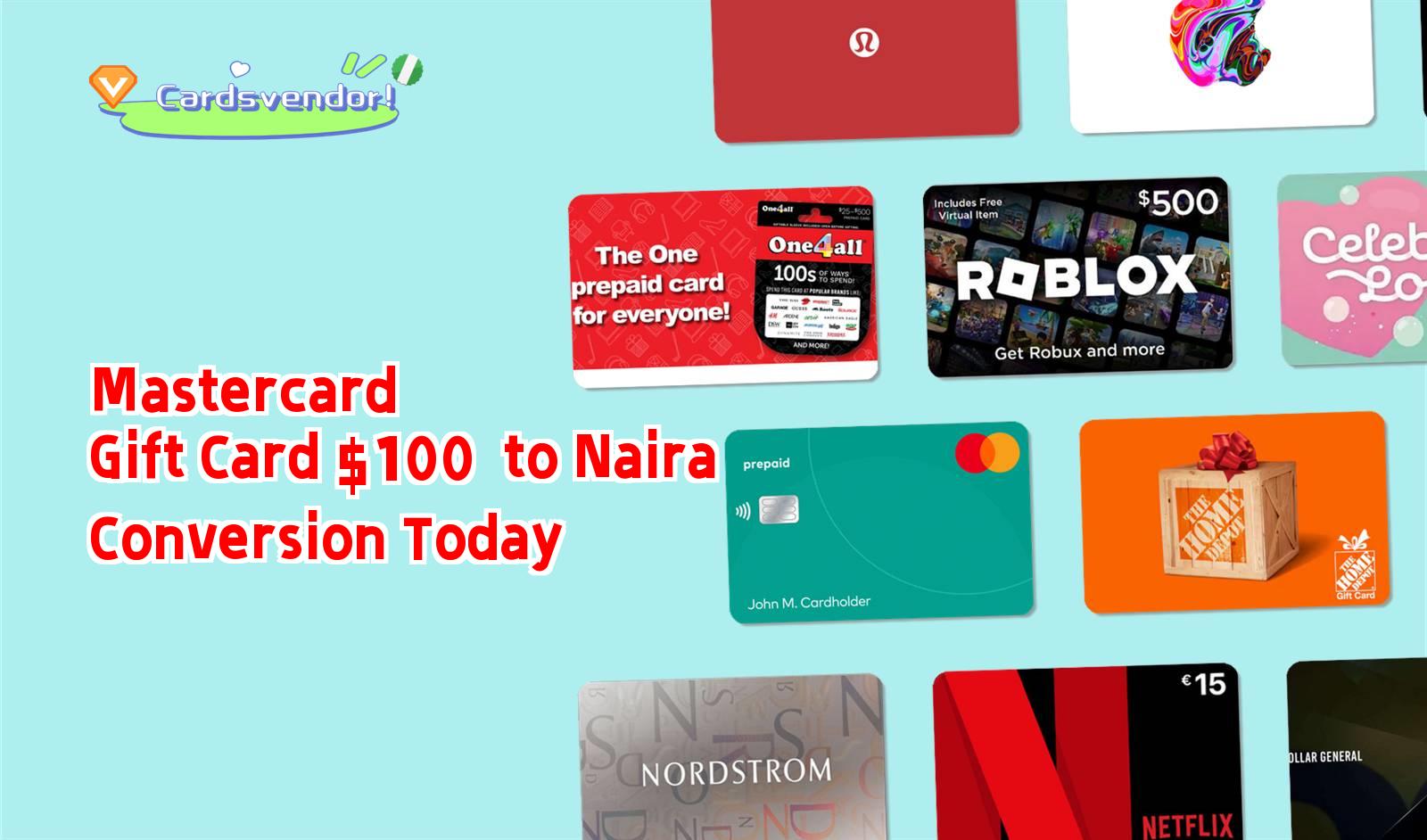
What Do Mastercard Gift Cards Entail?
The Mastercard Gift Card is a prepaid, plastic card that can be used anywhere Mastercard is accepted. It’s a convenient and secure way to give someone a present or to offer a gift of money. Users can load the card with a specific amount, and the recipient can then use it for purchases, paying bills, or getting cash back at ATMs.
These cards come in various denominations and designs, making them versatile for different occasions. They do not expire and typically do not incur fees, though it’s essential to check the terms of the specific card. Recipients can check the balance on the card online or via phone, and some cards can be reloaded with additional funds.
Mastercard Gift Cards are a popular choice for gifting because they provide flexibility and can be customized for the recipient’s preferences, without the worry of unused balances or the need to return unwanted items.

How much is Price of $100 Mastercard Gift Card In NGN?
$100 Mastercard Gift Card to Naira: Today’s Exchange Rate
The value of a 100USD Mastercard gift card depends on the ongoing exchange rate betweenUSD and Nigerian Naira (NGN). Currently, on Cardsvendor, a 100USD Mastercard gift card is valued between 125,000 and 155,000 Naira. The value of your Mastercard gift card may vary with market conditions. Factors such as demand and exchange rates can cause the card’s value to fluctuate over time. For the most accurate valuation, it is recommended to use a gift card rate calculator, which can provide the latest assessment of your card’s value.
| green dot | 10 | $ | 10,500 to 13,000 | Naira |
| green dot | 20 | $ | 21,000 to 26,000 | Naira |
| green dot | 30 | $ | 31,500 to 39,000 | Naira |
| green dot | 50 | $ | 52,500 to 65,000 | Naira |
| green dot | 100 | $ | 105,000 to 130,000 | Naira |
| green dot | 200 | $ | 210,000 to 260,000 | Naira |

In which countries can Mastercard gift cards be used?
Mastercard gift cards can be used in numerous countries worldwide. They are accepted in most retailers, online merchants, and service providers across the globe. However, the specific acceptance may vary by country. In the United States, they are widely accepted, and many international locations also recognize them. For exact details on acceptance in different countries, it’s best to check with Mastercard’s official website or contact customer service. It’s important to note that while Mastercard gift cards are generally accepted, some merchants may have restrictions or limits on their use.
Common Errors Of Mastercard Gift Cards
Card Not Activated: Check the activation instructions or contact customer service.
Expired Card: The card may have expired; check the expiration date.
Invalid PIN: Ensure you are using the correct PIN.
No Balance: Check the card’s balance online or at a store.
Lost or Stolen: Report lost or stolen cards immediately to Mastercard.
Service Fees: Some cards have fees; check the terms before purchasing.
Incorrect Activation: Follow the activation instructions carefully.
Blocked Card: The card may be blocked due to suspicious activity; contact customer service.
Not Accepted: Verify if the card is accepted at the store or website.
Card Not Shipped: Check the shipping status or contact customer service if it hasn’t arrived.
Factors that Determine Mastercard Gift Card Rates
1. Brand Reputation (??)
Gift cards from reputable brands often carry a premium due to the perceived value and trust associated with those brands. Luxury or exclusive brands might charge more to reflect their status.
2. Issuer Costs (??)
The costs associated with issuing, distributing, and maintaining gift cards can impact their prices. High operational costs may result in higher card values.
3. Reload and Expiration Policies (??)
Gift cards with reload options or extended expiration periods might be priced higher to cover the administrative and potential loss risks associated with these features.
4. Market Competition (??)
In a competitive market, issuers may lower prices to attract customers. Conversely, a lack of competition can allow issuers to charge more.
5. Issuer Branding (??)
Custom or co-branded gift cards, featuring specific designs or partnerships, can carry additional costs, leading to higher prices.
6. Service Fees (??)
Fees for purchasing, reloading, or inactivity can affect the overall cost of a gift card, influencing its price point.
7. Regulatory Compliance (??)
Compliance with financial regulations and anti-fraud measures can add to the cost of issuing gift cards, potentially raising their prices.
8. Demand and Supply (??)
High demand for certain gift cards can lead to increased prices, while oversupply may drive prices down.
9. Distribution Channels (??)
Purchasing gift cards through specific retailers or online platforms may involve additional fees, impacting their prices.
10. Seasonal Trends (??)
Demand for gift cards often fluctuates with the seasons, with higher prices during holidays or promotional periods.
